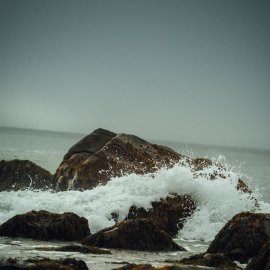RESCUE, part 11: Earth Law
-
English
-
ListenPause
[intro music]
Welcome to World Ocean Radio…
I’m Peter Neill, Director of the World Ocean Observatory.
Earth law is often called “eco-centric.” It is an emerging body of law for protecting, restoring, and stabilizing the functional interdependency of Earth's life and life-support systems. In other words, Earth law lets Nature operate naturally. It may be expressed in constitutional, statutory, common, or customary law, as well as in treaties and other agreements, both public and private. Earth law is both a departure from environmental law and a new context for its extension. It is considered eco-centric law, not anthropo-centric law, an alternative to the divine rights of man.
Within the framework of Earth law is the idea that ecosystems have the right to exist, thrive, and evolve—and that Nature should be able to defend those rights in court, just like people do. Some of the other specific movements falling under the banner of Earth law are rights for animals, ecocide as a crime, and Indigenous rights. Earth law has been used to establish legal rights for natural entities, such as rivers and other marine protected areas. In October 2022, in an article in “PLOS Biology”, an academic journal, a group of researchers called for the protections of Earth Law to be extended to the full ocean as an integrated ecosystem with intrinsic worth that provides incalculable resource value to all living entities on Earth, presently at risk of exhaustion by consumption without sustainable protection and practice. Dr. Mary Christina Wood, from the University of Oregon, in her 2014 book, “Nature’s Trust: Environmental Law for a New Ecological Age” (Cambridge University Press) describes a “public trust doctrine” an historical principle that holds that government respects all Nature, all terrestrial and marine resources, as a sovereign trust for the public, and that to license the exhaustion of those resources through consumption and pollution is a violation of Nature’s fundamental rights, and is illegal. Court cases brought by environmentalists based on this argument have been decided favorably, up to the Supreme Court.
The fossil fuel industry is the highest expression of the concept. By its unlimited consumption of oil and gas and coal, and by its cynical opposition to alternative technologies, the industry has perpetrated the greatest transfer of wealth ever; assets owned by the public transferred to private corporations and shareholders without compensation. That this transfer has been abetted by government by subsidies, credits, abatements, and research grants, and, further, that the cost of the external consequence has been passed on to public as toxins, emissions, acidification, poisoned water, extreme weather, climate refugees, resource wars, and many other negative, now visible impacts on human health, peace, and peace of mind adds an unforgiveable ironic dimension to this history. There ought to be a law.
Nature is sometimes portrayed as violent, unforgiving chaos, survival of the fittest as one measure of systemic success. But it also a place of astonishing harmony, diversity, integrity, and beauty that maintains balance, promotes life, and assures its future. It is continuity and sustainability contained, a dynamic, endemic force that transcends the boundaries and pretenses of our ambition. To break this order, especially with premeditation, is a crime against both Nature and humanity. Order is maintained by law; disorder is promoted by indifference to regulation and the common good. How do we protect Nature, and thus ourselves, from this self-harm and chaos? Earth Law is an answer, a penultimate treaty, an agreement equal to the guarantees of the essential rights of man. It entails pure democracy, all things equal, as if all men and all natural things have a mutual right to endure for the common benefit of all.
Any one of us can stand, even in the midst of devastation and ruin, and find solace, resilience, and hope in things that manifest the laws of Nature. There is order to be found before our very eyes. If we look. And by such recognitions, we can ratify a collective treaty, a utilitarian commitment to ourselves, our neighbors, even to strangers, toward a transformational re-order of values and behaviors. In such moments, no matter who, where, or when, in those moments, together we hold the tools and the possibility of RESCUE in our hands:
R for renewal;
E for environment;
S for society;
C for collaboration;
U for understanding; and
E for engagement.We will discuss these issues and more, in future editions of World Ocean Radio.
[outro music]
This week we continue the multi-part RESCUE series with a discussion of Earth law, a framework built upon the idea that ecosystems have the right to exist and thrive, and that Nature should be able to defend those rights in court. Can we ratify a collective treaty toward the protection of Nature? RESCUE as an acronym offers a plan for specific action and public participation: Renewal, Environment, Society, Collaboration, Understanding, and Engagement.
About World Ocean Radio
5-minute weekly insights dive into ocean science, advocacy and education hosted by Peter Neill, lifelong ocean advocate and maritime expert. Episodes offer perspectives on global ocean issues and viable solutions, and celebrate exemplary projects. Available for syndicated use at no cost by college and community radio stations worldwide.
Image
Photo by Tim Foster on Unsplash
@timberfoster
- Login to post comments



